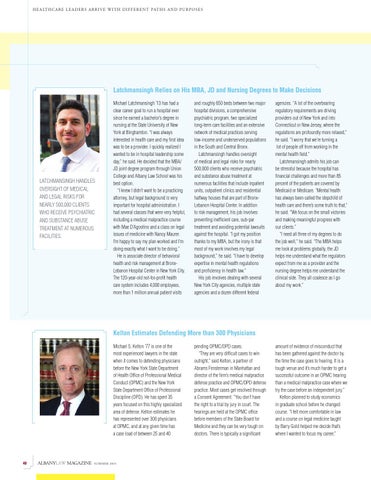H E A LT H C A R E L E A D E R S A R R I V E W I T H D I F F E R E N T PAT H S A N D P U R P O S E S
Latchmansingh Relies on His MBA, JD and Nursing Degrees to Make Decisions
LATCHMANSINGH HANDLES OVERSIGHT OF MEDICAL AND LEGAL RISKS FOR NEARLY 500,000 CLIENTS WHO RECEIVE PSYCHIATRIC AND SUBSTANCE ABUSE TREATMENT AT NUMEROUS FACILITIES.
Michael Latchmansingh ’13 has had a clear career goal to run a hospital ever since he earned a bachelor’s degree in nursing at the State University of New York at Binghamton. “I was always interested in health care and my first idea was to be a provider. I quickly realized I wanted to be in hospital leadership some day,” he said. He decided that the MBA/ JD joint degree program through Union College and Albany Law School was his best option. “I knew I didn’t want to be a practicing attorney, but legal background is very important for hospital administration. I had several classes that were very helpful, including a medical malpractice course with Mae D’Agostino and a class on legal issues of medicine with Nancy Maurer. I’m happy to say my plan worked and I’m doing exactly what I want to be doing.” He is associate director of behavioral health and risk management at BronxLebanon Hospital Center in New York City. The 120-year-old not-for-profit health care system includes 4,000 employees, more than 1 million annual patient visits
and roughly 650 beds between two major hospital divisions, a comprehensive psychiatric program, two specialized long-term care facilities and an extensive network of medical practices serving low-income and underserved populations in the South and Central Bronx. Latchmansingh handles oversight of medical and legal risks for nearly 500,000 clients who receive psychiatric and substance abuse treatment at numerous facilities that include inpatient units, outpatient clinics and residential halfway houses that are part of BronxLebanon Hospital Center. In addition to risk management, his job involves preventing inefficient care, sub-par treatment and avoiding potential lawsuits against the hospital. “I got my position thanks to my MBA, but the irony is that most of my work involves my legal background,” he said. “I have to develop expertise in mental health regulations and proficiency in health law.” His job involves dealing with several New York City agencies, multiple state agencies and a dozen different federal
agencies. “A lot of the overbearing regulatory requirements are driving providers out of New York and into Connecticut or New Jersey, where the regulations are profoundly more relaxed,” he said. “I worry that we’re turning a lot of people off from working in the mental health field.” Latchmansingh admits his job can be stressful because the hospital has financial challenges and more than 85 percent of the patients are covered by Medicaid or Medicare. “Mental health has always been called the stepchild of health care and there’s some truth to that,” he said. “We focus on the small victories and making meaningful progress with our clients.” “I need all three of my degrees to do the job well,” he said. “The MBA helps me look at problems globally, the JD helps me understand what the regulators expect from me as a provider and the nursing degree helps me understand the clinical side. They all coalesce as I go about my work.”
Kelton Estimates Defending More than 300 Physicians Michael S. Kelton ’77 is one of the most experienced lawyers in the state when it comes to defending physicians before the New York State Department of Health Office of Professional Medical Conduct (OPMC) and the New York State Department Office of Professional Discipline (OPD). He has spent 35 years focused on this highly specialized area of defense. Kelton estimates he has represented over 300 physicians at OPMC, and at any given time has a case load of between 25 and 40
40
ALBANYLAW MAGAZINE
SUMMER 2015
pending OPMC/OPD cases. “They are very difficult cases to win outright,” said Kelton, a partner of Abrams Fensterman in Manhattan and director of the firm’s medical malpractice defense practice and OPMC/OPD defense practice. Most cases get resolved through a Consent Agreement. “You don’t have the right to a trial by jury in court. The hearings are held at the OPMC office before members of the State Board for Medicine and they can be very tough on doctors. There is typically a significant
amount of evidence of misconduct that has been gathered against the doctor by the time the case goes to hearing. It is a tough venue and it’s much harder to get a successful outcome in an OPMC hearing than a medical malpractice case where we try the case before an independent jury.” Kelton planned to study economics in graduate school before he changed course. “I felt more comfortable in law and a course on legal medicine taught by Barry Gold helped me decide that’s where I wanted to focus my career,”
